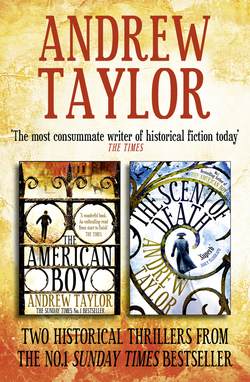Читать книгу Andrew Taylor 2-Book Collection: The American Boy, The Scent of Death - Andrew Taylor, Andrew Taylor - Страница 29
17
ОглавлениеAs the weeks slipped by and the weather grew steadily colder, the friendship between Charlie Frant and Edgar Allan flourished. Like many schoolboy friendships it was partly a defensive alliance, a strategy for dealing with a world full of Morleys and Quirds. Though similar in looks, they were different in temperament. The American was a proud boy who would not take insults lightly, who when teased would fly at his tormentors. Charlie Frant was gentler, and well supplied with pocket money. If you offended one of them, you had a taste of Edgar Allan’s anger, which was formidable. If you pleased one or both of them, however, you were likely to be among the beneficiaries when Charlie Frant next paid a visit to the pastry-cook’s.
As for myself, I felt the life of the school settle around me like an old coat. But one part of my life was incomplete. I own that I dwelt overmuch in my daydreams during this period. When I was in this unsatisfactory state I no longer thought much of Fanny, the girl whose ghostly presence had lingered in my mind for years. Instead, I frequently encountered both Miss Carswall and her cousin Mrs Frant. Daydreams have this advantage over real life: one is not obliged to be constant.
There was nothing to warn me of the troubles that lay ahead. One evening, however, Mr Bransby summoned Dansey and myself to his private room.
“I have had a disturbing communication from Mrs Frant, gentlemen,” he said. “She writes that her son and young Allan have been accosted in the village by the ruffian who approached them before. The man’s effrontery beggars belief.”
“We have heard nothing about this from the boys, sir?” Dansey said.
Bransby shook his head. “He did not linger. And there was no unpleasantness. No, it seems that he simply came up to them in the High-street, gave them a half-sovereign apiece, told them to mind their book and walked away.”
“How extraordinary,” Dansey said. “I gained the impression that he was not the sort of man who had a ready supply of half-sovereigns.”
“Just so.” Mr Bransby fumbled for his snuff-box. “I have interrogated Frant and Allan, of course. Frant mentioned the meeting to his mother in a letter. They had nothing substantial to add to what they had told her, except to emphasise that the man’s behaviour was noticeably more benevolent than on the previous occasion. Allan added that he was more respectably dressed than before.”
“So we may infer from all this that he is in more comfortable circumstances?”
“Indeed. But Mrs Frant is understandably somewhat agitated. She does not like the idea that boys of this establishment, and in particular her son, should be at the mercy of meetings with strange men. I propose to inform the boys that they must report any suspicious strangers in the village to me at once. Moreover, Mr Dansey, I would be obliged if you would alert the innkeepers and tradesmen to the danger. You and Mr Shield will circulate a description of the man in question.”
“You believe he may return, sir?”
“It is not a question of what I believe, Mr Dansey, but rather a matter of trying to allay Mrs Frant’s fears.”
Dansey bowed.
I could have revealed the identity of the stranger. But it was not my secret to tell. Nor did I think it would be kind to Edgar Allan. The gap between father and son was too wide to be easily bridged, especially in that the boy had no knowledge whatsoever of his natural father and believed him to have died long ago in the United States. It could only come as a shock to the lad to learn that David Poe was an impoverished drunkard on his very doorstep.
I said, “You do not think it likely he will venture to return, sir?”
“For my part, I doubt it. He will not show his face here again.”
In that, at least, Mr Bransby was entirely correct.
